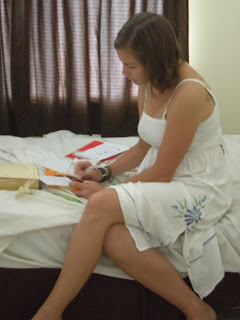The training village was quite the adventure. My immediate host family consisted of five sisters, age 18, 14, 10, 6, and 4, and one brother age 6, but there were also always a bunch of cousins/aunts/uncles/friends around. It took me forever to learn people’s names, and by the time I left I still wasn’t entirely sure who I was related to, nor could I tell you their names. Immediate family was too much for me to handle anyway.
My host family had a fairly large compound, with a ginormous front yard. My room was one of two rooms with a door that locked in the entire compound. I understand why most houses are open fales in Samoa – those four walls keep in all the heat. It wasn’t too bad in the middle of the day when I left my blinds closed because it keeps the sun out, but it holds in all the heat at night.

I’ve kind of gotten used to the weather here, but I haven’t come to grips with the fact that I will be continuously sweaty while I am here. While in the training villages, we had a span of four or five days when it was constantly cloudy, windy, and rained off an on, and I felt so cold that I had to pull out my sweatshirt. But mostly it was really hot, and those cold showers are nice and refreshing at the end of a long day. Now that I am back in the hotel for one week, I find it very ironic that it is so much more of a luxury to have air conditioning and a hot shower when a cold shower on a hot day is pretty much the same thing.
Training in the village consisted of two weeks of teaching practicum in the Samoan schools, but mostly it was just language, language, language. Sometimes I feel like I know plenty of Samoan to get by, but other times I feel like I’m incapable of holding a conversation because I only know the bare minimum. I’m sure I’m really somewhere in the middle and I’ll always feel like I’m lacking the word I’m looking for, but I really do think I know enough to get by for now. The vowel sounds seem to be the determining factor in Samoan words. There are so many ways to pronounce the vowels, and so many different vowel combinations. I feel like I do when I was trying to pronounce umlauts in German – I can’t quite get my tongue around them and I don’t have an ear for the subtle differences yet. Another tricky thing I’ve noticed about Samoan is that most of the words have multiple meanings. For example, tali. Tali is my Samoan name, but it also means “answer” so whenever my teacher said something about “tali,” I always thought she was asking me a question, but she was really just telling us as a class to answer the question. It took me about two weeks to figure that one out. I have a riddle for you; see if you can figure out what this sentence means.
Hints – the sentence is in past tense (“sa” is a past tense marker)
Fusi is a village
Adjectives always follow the noun they are describing
Meanings of tusi
Noun – a proper name (his name is Tusi), letter, book
Verb – to write
Adjective – striped (I’ll just give you this one – tusitusi is striped)
Sentence: Sa Tusi e tusi le tusi i le tusi tusitusi i Fusi.
When I would get back to my fale after training (the bike was generally left behind for walking, but I did perfect the art of riding a bike in a puletasi) there were usually about 20-30 people in my front yard playing volleyball. They used to play at the church, but I came home about a week into training and saw some of the boys digging holes in the ground to stick in giant logs. Then they climbed on each others’ shoulders (no ladders, chairs or anything to help them stand on each other) to tie up the volleyball net. So everybody started playing in my yard. I didn’t play very much because they are very intense players and I worried about my glasses breaking. The few times I did play, they seemed very impressed that I could serve the ball over the net. They would play volleyball for 2-3 hours, then leave just in time to get back to their fales for evening prayer (usually around 7:30-8).


My family insisted on dressing me pretty much 24/7. They would put me in a puletasi every morning for my language class and then I would get a different outfit when I got home because I didn’t need to be formal anymore. I’ve collected pictures of most (but not all) the outfits my family put me in. My personal favorite outfits are ones I don’t have pictures of because I couldn’t every figure out a way to ask my host family to take pictures of my outfits without asking why.
I take issue with this picture because I am really not that short, but I look tiny in this picture
Umbrellas became a regular accessory to any outfit - they are actually really useful here
Oh, and in case you're still wondering, that sentence translates to "Tusi wrote a letter in a striped book in Fusi"





























































